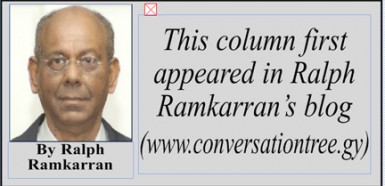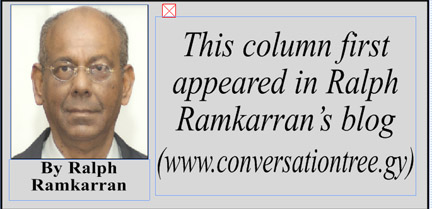Since Rudy Collins, Chairman of what was then known as the Elections Commission, put his life on the line in October 1992 against rampaging mobs determined to trash the Commission’s offices and derail the electoral process, the Commission has been the target of politicians who seek an excuse for losing elections.
With that history, Steve Surujbally showed exceptional courage in accepting the job as Chair in 1998 and remaining in office in the face of unfair, sometimes savage, criticism, the latest from Mr Manzoor Nadir of the PPP/C. After his term of office has come to an end, it would be a miracle if any other Guyanese would have the fortitude to accept the job.
According to the PNCR, which has lost all elections since 1992, each and every one has been rigged by the PPP and/or the Elections Commission. These allegations of fraud continued up to the 2011 elections, notwithstanding that all elections were judged to be free and fair by both overseas and local observers.

Elections in Guyana cannot be rigged. The efficiency of Gecom, its internal management capacity, its systems of control, its quality of training, its management of registration and of elections have all improved with every election and have continued to make giant strides. The standard of integrity and professionalism set by Rudy Collins has been maintained by all chairpersons.
Gecom administers laws and manages the systems established according to those laws. These were enacted by the National Assembly, largely supported by both major political parties. They were expected to deliver both an acceptable electoral roll and elections which are free and fair.
These laws require Gecom to invite persons who qualify to register. Persons responding to the invitation, have to prove their identity, must not yet have registered and must give an address. There is no law or practice that requires Gecom to go in the field and investigate the persons who apply to be registered. This is the task of political parties which, through their scrutineers, are given the names of registrants. They are free to check the identities or addresses of the registrants and make objections at the appropriate time. They have sufficient time to verify the registrants and their addresses between the time of registration and elections. If they are dissatisfied they have the opportunity of making objections during the claims and objections period. Failure to do so, and public complaints against Gecom thereafter, merely expose the failure of political parties to do their jobs.
There are strict rules enshrined in laws about deleting the names of persons who have died. The presence of a large number of deceased persons on the list is not evidence of fraud but of the lack of capacity of the government department which is the custodian of the records of births and deaths and which is required to report deaths which are registered to Gecom so that the names can be deleted. If the records have been supplied and Gecom has failed to delete the names, it must answer. The only other method by which names can be deleted is if claims are made at the appropriate time. Relatives rarely ever do so. Again, it is the task of the political parties, not Gecom, to ensure that names of deceased persons are deleted from the list by making objections during the claims and objections period.
For the sake of argument let us assume that the list contains a large number of fictitious and deceased persons. If there is a large enough number of such persons on the list to affect the outcome of the elections, it would be so obvious that it would be a national scandal. To vote for those persons on a scale that would affect the outcome of the elections would require a conspiracy involving hundreds of election officials, or more, and thousands of persons in various parts of the country to vote illegally. Blatant and open rigging activities can take place only in conditions where the entire electoral process has collapsed or has been hijacked. In every election some fraud takes place. If any takes place in Guyana it is so negligible that it cannot affect the outcome of elections.
Notwithstanding all of the positive developments since 1992 in the conduct of elections, and the positive findings of local and overseas observers, our history has left a legacy of undiminished suspicions. These suspicions will again drive allegations of rigging by the PNCR/APNU at the next elections as a defence mechanism to explain how, after ‘winning’ landslides in the past, it now loses. At the rate of its complaints and attacks against Gecom, if the PPP/C fails to get a majority, there will also be claims that the elections are rigged, also as a defence mechanism, since it refuses to acknowledge any reason why its supporters may be frustrated.
Guyana will be in a unique position in the world where Gecom, comprised of nominees of the two main political parties, is accused of rigging the elections against both of them.






